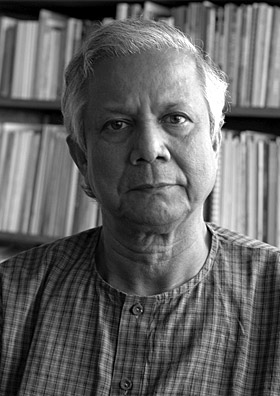Ever since the Centre banned Rs 500 and Rs 1,000 denomination notes last November, a lot of discussions have been going around on digital economy. While the Narendra Modi-led government has been relentlessly promoting cashless transactions over the past couple of months, it is no surprise that a digital economy cannot be forced on people where a large section of the population are still dependent on cash and have little knowledge of digital transactions.
 Muhammed Yunus (Image courtesy: www.nobelprize.org)
Muhammed Yunus (Image courtesy: www.nobelprize.org)
Going a step further, Nobel laureate Dr Muhammed Yunus on Thursday observed that the government alone cannot achieve digital ways of transactions. He said going digital should be made more exciting for people by rolling out more incentives to attract them.
Speaking in Bengaluru on the topic of ‘Social Business to Address Social Issues’, the founder of Grameen Bank, Bangladesh's most successful micro-financing company and community development organisation, did not mince words to state that India's micro-finance industry has been hit by demonetisation in the absence of cash.
“Demonetisation is an irreversible process and it needs to be seen how one can make the best use of it. If the main objective of the exercise was to get black money, all efforts should be made to get it,” he said.
Yunus, who won Nobel Prize for Peace in 2006, recalled that he had to face many questions when he began the micro-financing business model in Bangladesh. Many were apprehensive if it was a viable business because it would be very difficult to get back money from the poor.
However, it proved the other way around. “Micro-financing model has proved that one can lend to the poor and even get the money back in a very sustainable way. This model has also paved way for financial empowerment of women all around," remarked Prof Yunus.
In Bangladesh, Yunus's micro-financing model allows complete flexibility to the borrower to pay them back. "A person can decide the duration of the payback time. We do not have any problem with it as we are getting our money back with interest. We do not impose any penalty if a person is unable to repay in a given time frame," he explained.
Given the high rates of unemployment across the world, the social entrepreneur emphasised on the significance of self-employment. “They must use their creative capacity and become self-employed. Human beings can do anything if they desire and feel for it. One should do what is best for him or her and as long as it brings in money it is fine,” he added.
While a majority of the global wealth continues to be concentrated in the hands of a few people, Yunus noted that philanthropic initiatives such as that of Facebook founder Mark Zuckerberg is likely to make a huge social impact. Zuckerberg, along with his wife Priscilla Chan, had donated 99 per cent of their wealth from Facbook for charity on the birth of their daughter Max in December, 2015.




